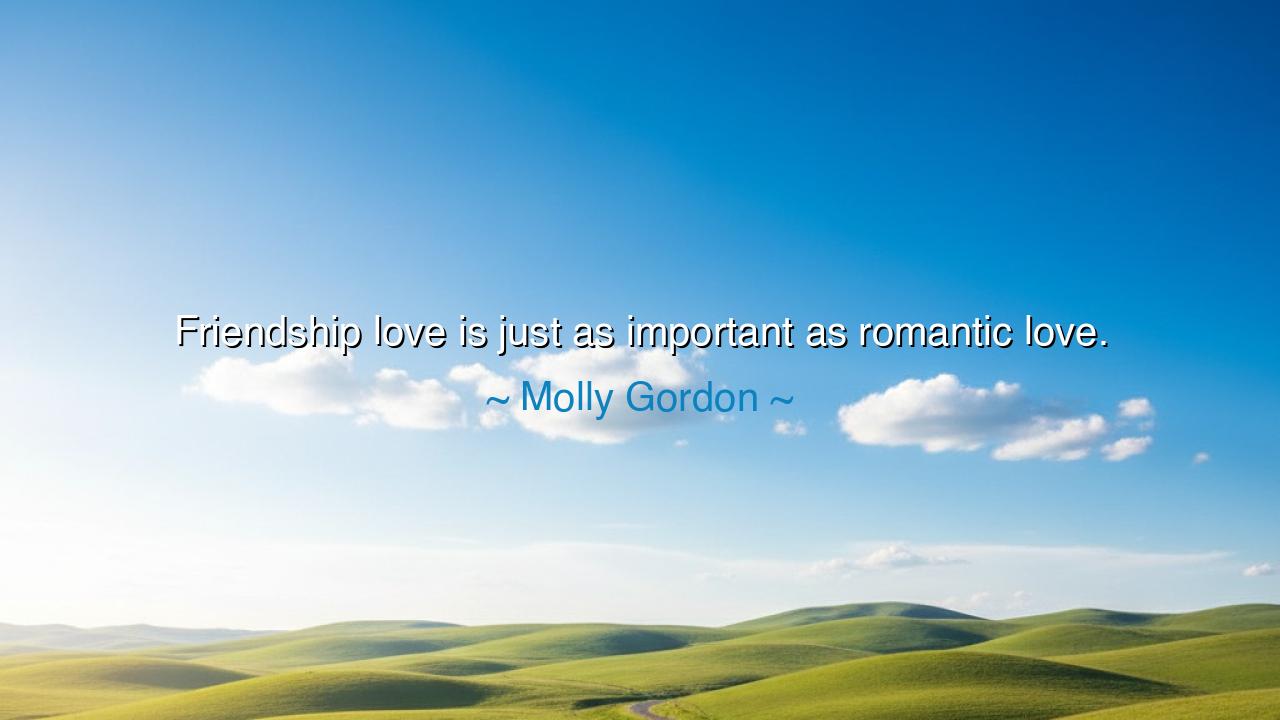
Friendship love is just as important as romantic love.






In the journey of life, where we seek meaning, connection, and the very essence of love, there are few truths more profound than the words of Molly Gordon, who proclaimed: "Friendship love is just as important as romantic love." This statement, so simple yet deeply resonant, calls us to reconsider the hierarchy of relationships in our lives. For too long, romantic love has been celebrated as the pinnacle of human connection, while the love between friends—a bond forged through shared experiences, trust, and mutual respect—has often been relegated to a lesser status. Yet, as Gordon wisely reminds us, friendship love is not merely an accompaniment to romantic love; it is a force that stands equal in its power and significance.
The ancient Greeks understood the immense value of friendship. They distinguished between several types of love, one of the most cherished being philia, the love shared between friends. Aristotle, in his great wisdom, spoke of friendship as the foundation of virtue, believing that true friendships were rooted not in convenience, but in shared values and deep respect for one another. Aristotle claimed that the best of friendships were those where both parties sought the good for the other, without selfishness or expectation. Such a bond was seen as a moral good, a key to living a virtuous life. In this, the Greeks held philia to be a love that not only nourished the individual but helped shape a just society.
Just as Aristotle believed in the transformative power of friendship, so too did the Romans. Cicero, that great orator, wrote eloquently about the importance of friendship in his work, "Laelius de Amicitia." For Cicero, true friendship was more than an emotional connection; it was an alliance of minds and hearts, a bond that transcended time and circumstance. He argued that friendship was essential for a flourishing life, for it provided not only support and companionship but also a mirror through which one could learn and grow. He believed that friendships were the bedrock of a virtuous society, and that a life without true friends was, in essence, a life incomplete.
In the modern world, we often hear the story of romantic love told in grand terms—of soulmates and eternal devotion. Yet, as we look to history, we find that friendship love has often been the true unsung hero of human connection. Take, for instance, the relationship between Virginia Woolf and her close friend Vita Sackville-West. While their connection was not one of traditional romance, it was profound and transformative. Their bond, deeply rooted in respect, admiration, and intellectual stimulation, enriched both of their lives in ways that transcended societal norms. This relationship was a vibrant testament to the power of friendship love—its ability to inspire, to support, and to provide a foundation for personal growth. Their friendship was just as important, if not more so, than any romantic affair.
This is not to diminish the importance of romantic love, but rather to remind us of the parallel power of friendship love. It is a love that can withstand time and change, that can be a source of solace and joy, and that is often the bedrock upon which other relationships are built. Friendships are not just relationships between individuals—they are the ties that bind us to our communities, to our values, and to the truths that sustain us. They help us to navigate life’s challenges, to understand ourselves better, and to grow in ways that romantic love alone cannot offer.
The lesson we must take from Gordon’s words is simple yet profound: we must value friendship love as much as we do romantic love. Friendship is not a mere “bonus” in life; it is essential to the well-being of the soul. Nurture your friendships with the same care and attention you would give to a romantic partner. Be present for your friends in times of need, offer them support, and cherish the moments of shared laughter and joy. Recognize that in the love of a friend, you often find a mirror that reflects your true self, and in their company, you experience growth in ways that other relationships might not allow.
So, let us commit to cultivating friendships that are built on trust, respect, and shared values. Let us not wait for romantic love to be the central force in our lives but recognize that friendship, in all its complexity, is a gift that stands alongside romantic relationships in its ability to bring us joy, comfort, and meaning. Reach out to those you call friends, invest in those connections, and build relationships that are truly grounded in mutual support and understanding. In doing so, you will find that the love you share with your friends is just as vital as any other, and in it, you will discover strength, resilience, and a deeper connection to the human experience.






AAdministratorAdministrator
Welcome, honored guests. Please leave a comment, we will respond soon